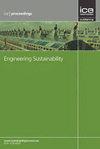在建筑、工程及建造业推行环境管理系统
IF 1.5
4区 工程技术
Q3 ENGINEERING, CIVIL
Proceedings of the Institution of Civil Engineers-Engineering Sustainability
Pub Date : 2023-10-30
DOI:10.1680/jensu.23.00031
引用次数: 0
摘要
在建筑、工程和施工(AEC)领域实施和使用环境管理系统(ems)受到了全世界的关注,但从来没有通过现象学的镜头。本研究调查了在英国的AEC组织中实施和使用ISO 14001的专家的“生活经验”。采用半结构化访谈的定性研究策略,对对话进行了广泛的分析,揭示了几个主题——即,参与者认为ISO 14001不仅仅是一个环境商业工具,ISO 14001提供了一种实现可持续发展的手段,ISO 14001认证为业务增长打开了大门,此外,ISO 14001不仅仅是一个徽章,而是现代商业的必需品。该研究还显示,并非所有要求获得ISO 14001认证的组织本身都获得了认证。基于这一证据,与先前的研究相反,提出ems主要是为了节省成本和遵守立法,作为招标过程的一部分,现在似乎是组织获得和保持国际标准化组织认证的主要动机。此外,一些组织不愿意陈述其可持续发展目标或将其运营纳入将被审计的环境管理体系,因为这可能会向利益相关者强调他们的不良表现。本文章由计算机程序翻译,如有差异,请以英文原文为准。
Implementing Environmental management systems in the architecture, engineering and construction sectors
Implementing and using environmental management systems (EMSs) in the architecture, engineering and construction (AEC) sectors has received worldwide attention but never through a phenomenological lens. This study investigates the ‘lived experiences’ of experts who have implemented and used ISO 14001 in AEC organisations based in the UK. Using a qualitative research strategy of semi-structured interviews, extensive analysis of the conversations reveals several themes – namely, participants believe that ISO 14001 is not just an environmental business tool, ISO 14001 offers a means of delivering sustainability, ISO 14001 accreditation opens doors for business accruement and, moreover, ISO 14001 is more than a badge, rather it is a modern-day business necessity. The study also reveals that not all organisations asking for ISO 14001 have the accreditation themselves. Based on this evidence, and contrary to previous studies that have proposed that EMSs are chiefly implemented to save costs and comply with legislation, it seems that box ticking as part of the tendering process is now the major motivation for organisations to attain and maintain International Organization for Standardization accreditation. Further, concerns are expressed that some organisations are unwilling to state their sustainability objectives or embed their operations within an EMS that will be audited because it could emphasise their poor performance to stakeholders.
求助全文
通过发布文献求助,成功后即可免费获取论文全文。
去求助
来源期刊

Proceedings of the Institution of Civil Engineers-Engineering Sustainability
ENGINEERING, CIVIL-ENGINEERING, CIVIL
CiteScore
3.70
自引率
16.70%
发文量
44
审稿时长
>12 weeks
期刊介绍:
Engineering Sustainability provides a forum for sharing the latest thinking from research and practice, and increasingly is presenting the ''how to'' of engineering a resilient future. The journal features refereed papers and shorter articles relating to the pursuit and implementation of sustainability principles through engineering planning, design and application. The tensions between and integration of social, economic and environmental considerations within such schemes are of particular relevance. Methodologies for assessing sustainability, policy issues, education and corporate responsibility will also be included. The aims will be met primarily by providing papers and briefing notes (including case histories and best practice guidance) of use to decision-makers, practitioners, researchers and students.
 求助内容:
求助内容: 应助结果提醒方式:
应助结果提醒方式:


